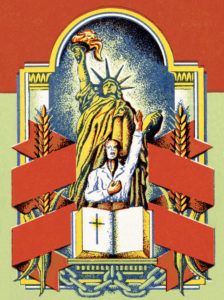Getty

The Queen’s service of coronation in 1953 was famously televised to the whole of Britain – all of it except for one part of the service that was thought to be too holy for the cameras: the moment of anointing. As far as Christian theology is concerned, and indeed Jewish theology before that, it is the moment of anointing that makes the monarch a monarch. The crown is just for show. The pivot of the service, the moment of transformation, is when the Queen-to-be is marked with oil.
In Jewish theology, the word messiah means “the anointed one”. Understanding this is key to understanding what Christians now call Holy Week, the last days of Jesus, the meaning of his death and crucifixion. Messiah was a word that had been used for centuries to describe all that the people of Israel were looking for in a future king….
He would be a ruler to unite the 12 tribes of Israel…
He would be in the mould of, and even literally a descendant of, David, the greatest Jewish king of the all…
This king messiah would be a political figure and also a religious one…
All nations would bow before him…
He was going to be so powerful that he would destroy hunger, illness and even death.
So said Isaiah, the most enthusiastic proponent of the messianic ideal – and, incidentally, the person Jesus quotes the most during his ministry.
This was exactly what many of Jesus’ followers wanted him to be. Not least because this messiah figure would be just the sort of person needed to drive out the hated Roman occupiers. And so, at the moment of his arrival in Jerusalem, with extraordinary rumours travelling ahead of him and excitement running high, some of his more eager supporters shouted out that this was indeed the new king, the messiah. And Mary, one of his followers, poured oil over his head, just to make the point. It was an action with deep theological resonance:
“Pour the oil on his head and declare: ‘This is what the LORD says: I anoint you king over Israel.’”
– (2 Kings 9:3)

But he wasn’t. At least, he wasn’t anything like the sort of king that the people had wanted or expected. And within a couple of days most of his followers had abandoned the cause. The Jesus movement turned out to be another messianic flash in the pan. And, just to underscore its failure, the Romans mocked up a sort of grisly anti-coronation to make the point publicly. He was nailed up to an old bit of wood, handed a pretend crown hastily put together from a nearby thorn bush as a joke, covered in spit and sarcastically reminded of his messianic pretentions: “King of the Jews,” they sniggered.
About a century later, another messianic figure would rebel against the Romans. In this regard, Simon bar Kokhba was much more successful than Jesus of Nazareth. Simon was even able to set up – temporarily, at least – an independent Jewish state. But the Romans squashed that uprising too. The international market for slaves was flooded with newly captured Jews to such an extent that the price of a Jewish slave fell to that of a horse. Politically, the messianic ideal has been a disaster for the Jewish people, and many Jewish thinkers were happy to allow this theology to fade away – though it was revived by the Hasidic movement in the 18th century. And there are some who still believe that Rabbi Menachem Mendel Schneerson (1902-1994) from Crown Heights in Brooklyn was the King Messiah.
Christianity still loves the language of kings and kingdoms. At this time of year I often have Handel’s Messiah as an earworm: “King of kings and Lord of lords. And he shall reign for ever and ever and ever.” And the coronation service, arguably the centrepiece of our constitution, continues on in that vein. Too many of us are addicted to all the glamour and pageantry of monarchy, that ancient fantasy about the coming together of religious and political power.
But what we learn in Holy Week was that Jesus was not that sort of king and his kingdom was not of this world. In worldly terms, in the terms that many expected, the Jesus movement was a failure. And it should stay that way. His spoof coronation on a cross – ideologically, a million miles from the coronation of our kings and queens – should give us real hesitation when we establish too firm a connection between religion and the politics of power.










Join the discussion
Join like minded readers that support our journalism by becoming a paid subscriber
To join the discussion in the comments, become a paid subscriber.
Join like minded readers that support our journalism, read unlimited articles and enjoy other subscriber-only benefits.
Subscribe